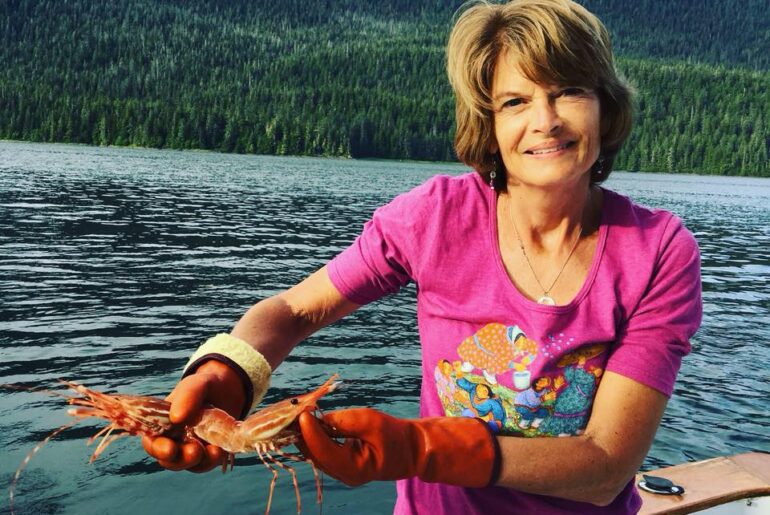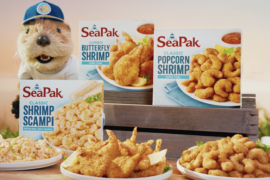Senators Lisa Murkowski and Dan Sullivan (both Republicans of Alaska) have introduced the Wild USA Seafood Act of 2023, which would establish a “Wild USA Seafood” label for wild-harvested seafood caught in United States waters. The bill would allow the seafood industry in the USA to better promote wild-harvested seafood, including fish, crustaceans, and aquatic plants harvested domestically.
“Alaska’s seafood is the best in the world, and I’m proud to lead on this effort that would ensure consumers know their food is being harvested by hardworking American fishermen,” said Murkowski (pictured above). “Consumers want to know where their food comes from – and by creating a specific label allowing wild seafood, like Alaskan salmon caught in Bristol Bay, wild kelp harvested in Southeast, or pollock caught in the Bering Sea the option to be labeled as ‘Wild USA Seafood,’ we’re ensuring consumers know they are purchasing the highest-quality seafood from the best-managed fisheries in the world.”
Senator Sullivan added: “I join Alaskans in being incredibly proud of our sustainable fisheries and the seafood produced in the waters of the United States. Americans love Alaska seafood and other wild seafood products that come from America’s waters. They know that there is no better source for the best tasting, and most nutritious seafood. But it can be hard to know where such food comes from. Americans deserve to have this information, and a labeling standard for ‘Wild USA Seafood’ will help them choose the best seafood products in the world.”
“Our research tells us that ‘Product of USA’ and ‘wild-caught’ are two of the top five US consumer motivations for choosing seafood over other proteins. Wild-caught Alaska and other USA seafood is the gold standard for sustainable management, and American fishermen, processors, retailers, and consumers will benefit when the US origin of our seafood products is on the label regardless of where processing occurs,” said Greg Smith, communications director at the Alaska Seafood Marketing Institute (ASMI).
Fight to Close Russian Seafood Loophole
Meanwhile, both of Alaska’s senators are carrying on the continued fight against imports of Russian seafood into the United States despite the fact that there is a prohibition in place. On June 22 Sullivan attempted to expedite passage of his recently-introduced U.S-Russian Federation Seafood Reciprocity Act of 2023, bipartisan and bicameral legislation to close a loophole that is allowing Russian-origin seafood that has been reprocessed in other counties to be imported into the United States at the same time American fishermen are afforded zero access to the Russian market. However, his bill was blocked by Senator Ed Markey, a Massachusetts Democrat. In February of 2022, Sullivan tried to pass legislation to establish reciprocity in the US-Russia seafood trading relationship, but the effort was also blocked by Markey.

“Russian seafood companies are largely owned by Russian oligarchs who are supporting Putin’s war of aggression in Ukraine, and, of course, they have been stealing market share from American and Alaskan fishermen. Does anyone in America think this makes sense? It doesn’t,” said Sullivan. “Russia and China are colluding to avoid the Biden executive order. It is hurting American and Alaskan fishermen, once again, and it is strengthening Russia: the oligarchs, the government, the Putin war machine…What I am trying to do now with my legislation is close the loophole. It is going to broaden the application of the President’s executive order to encompass seafood products harvested in Russian waters or by Russian vessels. That is it. That is what my bill does. Who in America, who in the Senate would be against that?”
In March of 2022, at the urging of Senators Sullivan and Murkowski, President Biden signed Executive Order 14068, which prohibits the import of unaltered seafood originating from Russia. However, EO 14068 failed to block Russian seafood that has been substantially transformed in another country through reprocessing. American fishermen are still blocked from selling on the Russian market due to Russia’s own prohibition on the import of US and other western seafood products since 2014.
“There are many ways to support Ukraine in this awful war waged by Putin. Sanctions should matter as we squeeze Russia’s economic prosperity used to attack Ukraine,” said Murkowski. “Alaskans have faced a one-sided Russian embargo on seafood since 2014. It’s well past time we ensure America’s seafood economy is safeguarded against unfair trade practices.”





